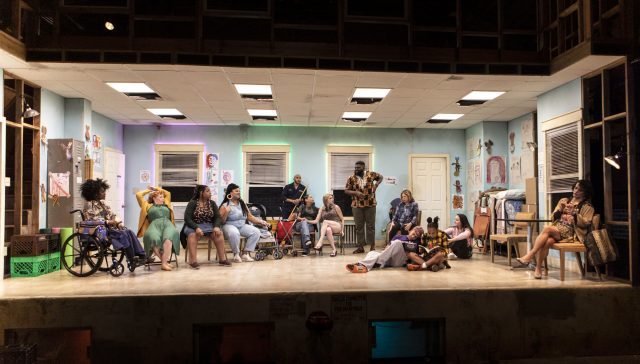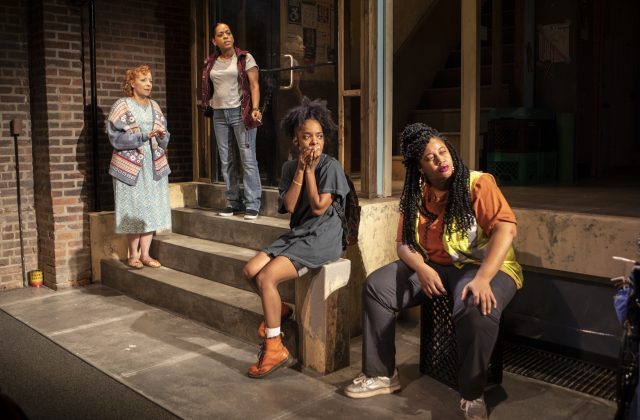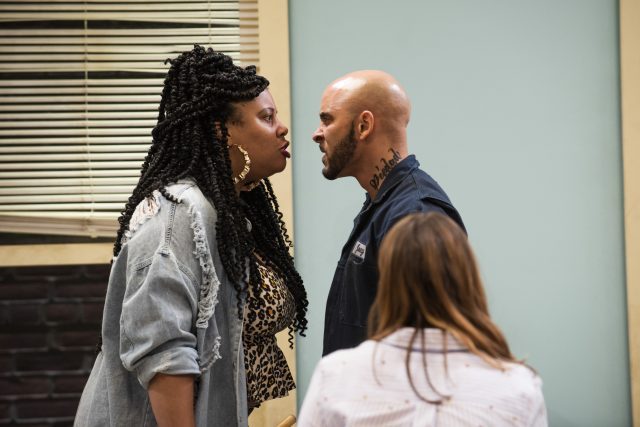
Stephen Adly Guirgis’s Halfway Bitches Go Straight to Heaven features another large cast of well-drawn characters (photo © Monique Carboni)
Atlantic Theater Company
Linda Gross Theater
336 West 20th St. between Eighth & Ninth Aves.
Tuesday – Sunday through December 29, $81.50
866-811-4111
atlantictheater.org
New York City native Stephen Adly Guirgis has spent much of his career creating wickedly funny, socially relevant plays set in minority communities where the underrepresented, the underserved, and the marginalized confront religion, law enforcement, poverty, racism, systemic institutions, and family dynamics as they battle against a system set up to keep them down. Most of his plays, including Our Lady of 121st Street, In Arabia, We’d All Be Kings, and The Little Flower of East Orange, feature large ensembles that form tight-knit communities onstage. Such is the case with Guirgis’s return to the Atlantic, where his Pulitzer Prize-winning play, Between Riverside and Crazy, debuted in 2014, with the world premiere of the fiendishly hilarious and hard-hitting Halfway Bitches Go Straight to Heaven, which opened last night at the Linda Gross Theater.

A woman’s residence is the setting for new play by Pulitzer Prize winner Stephen Adly Guirgis (photo © Monique Carboni)
The three-hour LAByrinth Theater coproduction, which flies by with one intermission, takes place in Hope House, a government-funded women’s residence for addicts, the abused, the mentally ill, and survivors of domestic violence. It is run by the strict, serious Miss Rivera (Elizabeth Rodriguez) and Nigerian social worker Mr. Mobo (Neil Tyrone Pritchard). Among those who find shelter at the home are the tough-talking Sarge (Liza Colón-Zayas); her single-mother girlfriend, Bella (Andrea Syglowski); teenage poet Little Melba Diaz (Kara Young); the foul-smelling Betty Woods (Kristina Poe); ex-con Queen Sugar (Benja Kay Thomas) and her bestie, Munchies (Pernell Walker); the lonely, alcoholic Rockaway Rosie (Elizabeth Canavan); the wheelchair-bound rule-breaker Wanda Wheels (Patrice Johnson Chevannes); the trans Venus Ramirez (Esteban Andres Cruz); and the twentysomething Taina (Viviana Valeria), who takes care of her mentally ill mother, Happy Meal Sonia (Wilemina Olivia-Garcia). Also on the staff are eager white millennial social worker Jennifer (Molly Collier); ex-con janitor Joey Fresco (Victor Almanzar); and Father Miguel (David Anzuelo), who has a dark secret in his past. Seventeen-year-old Mateo (Sean Carvajal), whose mother is staying at the home, often helps out, allowed to hang around as the women share their often very private concerns about their troubled lives.
Narelle Sissons’s bilevel set consists of the main gathering room, a stoop, an outdoor bench, a dark alley, a balcony, and a concrete front space where the residents gossip and drink and smoke in defiance of the regulations. LAByrinth artistic director John Ortiz (Guinea Pig Solo, Jack Goes Boating) infuses the proceedings with tremendous vitality as Guirgis’s well-developed characters fight for survival. Taina has a chance to go back to school but is terrified of leaving her mother. Venus insists on staying even though several residents cruelly reject her claim to female identity, accusing her of unfairly invading their safe space. Father Miguel jostles with a man (Greg Keller) who demands to see his wife, who has a restraining order against him. Miss Rivera isn’t sure that Jennifer has what it takes to deal with the residents, who can be harsh and unforgiving. Wanda Wheels seems determined to drink herself to death. And at the center of it all is Sarge, superbly played by Guirgis regular and Tony nominee Rodriguez (Orange Is the New Black, The Motherf**ker with the Hat). A veteran with PTSD, Sarge is fierce and unrelenting, quick to brutally insult people, especially Venus and Betty, but she sometimes lets her more tender and loving side show through. She tells Bella, “I commanded a platoon. I survived combat. Kept my people safe. Took care of the villagers as much as I could. I looked death in the eye — twice — and I didn’t flinch. I can do this, Bella. I can do this with you. If you let me.” Sarge approaches her life like she’s embroiled in a never-ending war, which is true of many of the women living there.

Ex-cons Queen Sugar (Benja Kay Thomas) and Joey Fresco (Victor Almanzar) face off in Halfway Bitches Go Straight to Heaven (photo © Monique Carboni)
The title comes from a poem Little Melba Diaz reads that sums up much of what the play is about, the difficulties and challenges these women can’t break free from: “Halfway Bitches go straight to Heaven / I ex-caped foster care and met a boy named Kevin / He was the apple of my eye but nigga turned into a lemon . . . No money in my pocket, I was feeling kinda low. . . . Words are turds and rhymes are crimes / Memories mere summaries, / Though I might some day share some of these,” she declares. Despite getting a little syrupy as it winds down, Halfway Bitches Go Straight to Heaven is another deeply affecting, honest, and gutsy work that lays bare the lives of too many women who rightfully doubt there’s any light at the end of the tunnel for them.